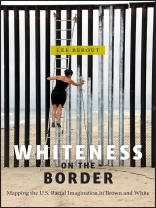The many lenses of racism through which the white imagination sees Mexicans and Chicanos
Historically, ideas of whiteness and Americanness have been built on the backs of racialized communities. The legacy of anti-Mexican stereotypes stretches back to the early nineteenth century when Anglo-American settlers first came into regular contact with Mexico and Mexicans. The images of the Mexican Other as lawless, exotic, or non-industrious continue to circulate today within US popular and political culture. Through keen analysis of music, film, literature, and US politics, Whiteness on the Border demonstrates how contemporary representations of Mexicans and Chicano/as are pushed further to foster the idea of whiteness as Americanness.
Illustrating how the ideologies, stories, and images of racial hierarchy align with and support those of fervent US nationalism, Lee Bebout maps the relationship between whiteness and American exceptionalism. He examines how renderings of the Mexican Other have expressed white fear, and formed a besieged solidarity in anti-immigrant rhetoric and policies. Moreover, Whiteness on the Border elucidates how seemingly positive representations of Mexico and Chicano/as are actually used to reinforce investments in white American goodness and obscure systems of racial inequality. Whiteness on the Border pushes readers to consider how the racial logic of the past continues to thrive in the present.
Om författaren
Lee Bebout is Professor of English at Arizona State University. Bebout teaches on and researches in the areas of race, social justice, and political culture. He is also the author of Whiteness on the Border: Mapping the US Racial Imagination in Brown and White.












